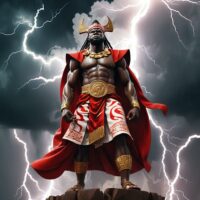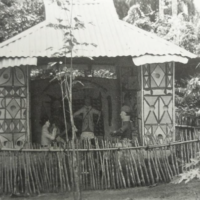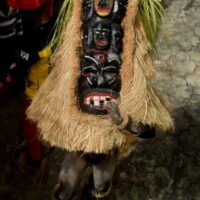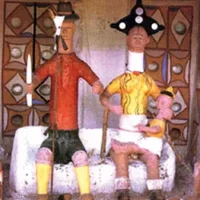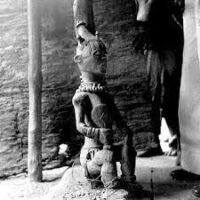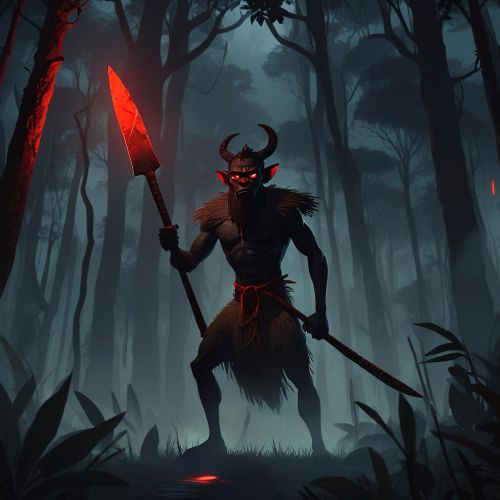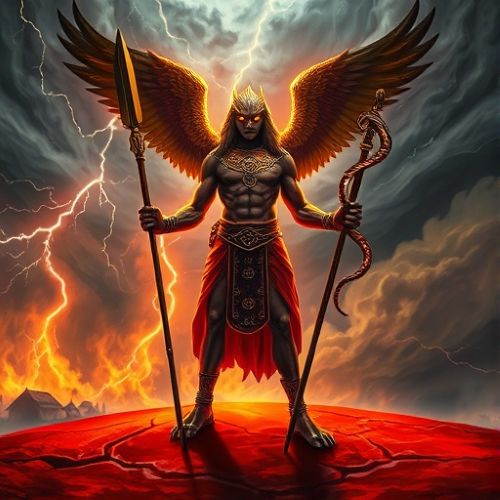Amadioha : God of Thunder
Listen
At a glance
| Description | |
|---|---|
| Origin | Igbo Mythology |
| Classification | Gods |
| Family Members | N/A |
| Region | Chukwu (Father), Ala (Mother) |
| Associated With | Thunder, Lightning, Justice |
Amadioha
Introduction
Amadioha is one of the most revered and formidable deities in Igbo mythology, widely worshipped across southeastern Nigeria. Known as the god of thunder, lightning, justice, and divine retribution, he serves not only as a weather god but also as the ultimate moral authority in Igbo spiritual life. His role extends beyond controlling storms—Amadioha embodies the collective conscience of the people, enforcing laws and punishing wrongdoing with unflinching precision. When thunder roars and lightning strikes, the Igbo see it as the voice and judgment of Amadioha. His influence is deeply woven into the spiritual and cultural identity of the Igbo, and his presence remains a symbol of justice, truth, and cosmic balance.
Physical Traits
Amadioha is rarely portrayed in human form, as his power is better expressed through symbolic representations. His sacred animal is the ram, which embodies strength, sacrifice, and purity, and is a common offering in rituals performed in his honor. Lightning and thunder serve as his divine weapons, carrying out justice against wrongdoers. The colors red and white dominate his imagery—red signifying power and wrath, and white representing purity, fairness, and divine order. White chalk, known as nzu, is a ritual element associated with him, used to mark truth and sincerity in ceremonies. His connection with the sun links him to cosmic order, illumination, and the guiding light of morality. Shrines dedicated to him often display these symbols, and his presence is invoked through ritual chants, storm sounds, and sacrificial rites.
Family
In Igbo cosmology, Amadioha is often described as the divine enforcer, complementing the role of Ani, the Earth goddess and lawmaker. In some traditions, they are regarded as husband and wife, working together to maintain moral and natural order. Other accounts present him as the son of Chukwu, the supreme deity, and Ani, forming a divine trio representing sky, earth, and justice. A number of oral histories describe Amadioha as a primordial force who emerged from the sky to embody the will of the people. His earthly center of worship is traditionally linked to Ozuzu in Etche, Rivers State, where his main shrine is still revered. While Ani governs the laws, Amadioha ensures those laws are upheld, creating a balance between moral guidance and enforcement in Igbo society.
Other names
The worship of Amadioha spans many communities, each with its own name for the deity. In some areas, he is called Kamalu or Kamanu, while others know him as Kalu Akanu or Amadiora. The title Ofufe emphasizes his thunderous authority, while Igwekaala and Igwe connect him to the celestial realms. Epithets like Egbe Eluigwe (“heavenly guns”) poetically describe the explosive power of his thunderbolts. These variations in name reflect both linguistic diversity and localized interpretations of his power. Regardless of the name used, invoking Amadioha in oaths, curses, or blessings carries a weight of spiritual seriousness, as his justice is considered immediate and irreversible.
Powers and Abilities
Amadioha’s powers extend far beyond controlling the skies. As the god of justice, he punishes corruption, deceit, and moral transgressions without hesitation. Victims of his wrath are often believed to be struck by lightning, their fate seen as divine judgment. In disputes, oaths sworn in his name bind the swearer to absolute truth, as breaking them risks immediate retribution. He also serves as a patron of peace, love, and unity, ensuring harmony within the community when appeased.
Legends tell of his role in creation, where he struck a silk cotton tree with lightning, splitting it open to reveal the first man and woman. His influence also extends to agriculture and prosperity, as his favor is sought for fertile lands and abundant harvests. In some traditions, he is credited as a god of craftsmen, sending lightning to destroy evil spirits in trees meant for carving. Certain myths describe him as a warrior wielding a divine sword, Mmaagha Kamalu, capable of glowing red in the presence of evil and granting victory in battle to mortals he favors. This combination of creative, protective, and punitive powers underscores his multifaceted role in Igbo spirituality.
Modern Day Influence
Even in an era where Christianity and Islam dominate religious life in Igboland, Amadioha’s name continues to hold cultural significance. His image is preserved in proverbs, casual expressions, and oaths. Phrases such as “Amadioha magbukwa gi” (“May Amadioha strike you down”) are still common in everyday speech, often as emphatic warnings rather than literal curses. Some individuals even claim that swearing an oath at Amadioha’s shrine is more binding than doing so on a Bible or Quran.
His presence in modern culture is evident in Nollywood films, literature, and art, where he is portrayed as both a protector of the innocent and a destroyer of the corrupt. Festivals honoring him still occur in rural communities, preserving the rituals and offerings that have defined his worship for centuries. Among the Igbo diaspora, Amadioha has become a symbol of cultural pride and a link to ancestral heritage, often featured in discussions about reclaiming indigenous traditions. Scholars draw parallels between him and other thunder gods such as Sango of the Yoruba and Thor of Norse mythology, noting his unique combination of meteorological control and moral enforcement.
Amadioha’s enduring relevance lies in his dual nature: he is both a feared force of nature and a deeply respected guardian of justice. In a modern world where traditional belief systems face challenges, his story continues to inspire not only spiritual devotion but also a broader appreciation for indigenous African knowledge systems.
Related Images
Source
Ferris, C. (n.d.). Amadioha: The Igbo God of Thunder, Justice, and Lightning. Mystery in History. Retrieved from https://mysteryinhistory.com/amadioha
Igbo History TV. (n.d.). The Fascinating Legend of Amadioha – The Igbo God of Thunder. Retrieved from https://igbohistorytv.com/blog/the-fascinating-legend-of-amadioha-the-igbo-god-of-thunder
Bulbapp. (n.d.). Exploring the Mystique of Amadioha: The Igbo God of Thunder and Justice. Retrieved from https://www.bulbapp.io/p/6e90d51e-5a21-458b-a66a-ed530b849505
Wikipedia contributors. (n.d.). Amadioha. Wikipedia. Retrieved from https://en.wikipedia.org/wiki/Amadioha
Ozikoro. (n.d.). Amadioha: The Thunder God Loved and Feared by the Igbo. Retrieved from https://ozikoro.com/amadioha-the-thunder-god-loved-and-feared-by-the-igbo


